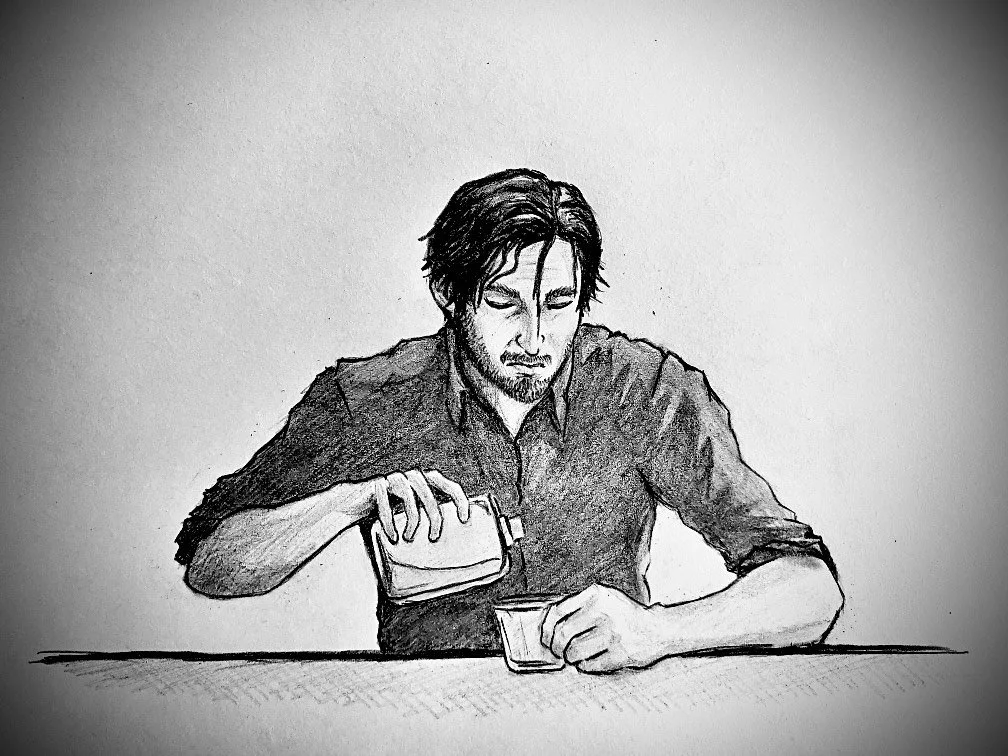The Divided Line: Elias [Part 1]
It began slowly—the plague, the greed, the riots. Revolutionaries rose up behind symbols, murals, and songs, while the masses were fed machinery and religion. In the wake of the destruction, politicians deemed art a dangerous thing—a worthless thing—and the masses agreed. They took away the paint, the books, and the instruments. But they could not wholly silence the artists. These are the stories they left behind.
Elias tipped the glass back and swallowed its dregs, setting the drink down with a trembling hand.
He hadn’t meant to kill the boy. In truth, he hardly remembered doing it. The details were lost to a liquor-steeped haze. He remembered the blood, though. He remembered the boy’s blank eyes, wide and unseeing. That strange shock of death.
Elias grabbed the gin from the counter and filled his glass again, desperate for the sweet oblivion at the bottom of the bottle.
There, he could see his wife again. There, she could forgive him.
A screen on the far wall of the living room flashed footage of the train yard. Newscasters murmured over the clips. He heard his name in the muddle, caught a photo of himself in his black officer’s uniform with an arm draped over his brother Florian’s shoulders. The photo had been taken nearly fifteen years ago on the day they’d graduated from the academy. All smiles and grand aspirations.
He had called Florian when the boy had died, and his brother had come without question. An aerodyne had landed on the cordoned-off road, and officers had plucked the body from the red-tainted concrete and carried it away.
“It’ll be alright,” Florian had said as Elias wretched against the wall. “No one needs to know. We’ll tell them you stepped in to protect the city. You’ll be a hero.”
That was what Florian always did. No matter the mess Elias made, Florian found a way to clean it up.
Elias downed the gin and closed his eyes, letting it numb the throb of his thoughts. He blinked a few times, felt the world tilt, felt the weight in his chest lessen.
Elias pours another.
Illustration by Ethan Lee
Florian had told him he’d done the right thing, trying to stop the boy. While the boy himself posed little danger, the ideas he carried with him, the ideas he and his friends painted on the side of that train—those were dangerous. And wrong ideas were a sickness which spread like no other.
Elias thumbed the spot on his ring finger where only the phantom of his wedding band remained. Anna had been plagued with those ‘wrong ideas’, yet she had been everything that was good in Elias. She would think him a monster for what he’d done.
Elias turned off the screen with its newsmen who spoke his praise and sank into the armchair across the room, plucking a thin volume off the nearby bookshelf as he passed. The books were more for aesthetic than anything else; some archaic idea that a bookshelf in one’s house spoke of scholarship and intelligence, even if one never read any of the tomes.
Each text looked the same: black covers with gilded titles. This one was labeled, The Republic. Anna had poured over it for hours in the weeks before her death. They were government-issued texts, hand selected by the Minister of Education, supposedly containing none of the passions or sins of the books the boy had died for. Anna had found those passions anyway.
Elias opened the book and flipped through its pages. She had written in the margins, defiled its pristine pages. A small act of rebellion. She’d marked a paragraph on the page he’d turned to with a crooked line.
It read:
The just man in this situation will be scourged, racked, and imprisoned, will have his eyes burned out, and finally, after suffering all evils, he will be impaled and will learn by experience that he should desire to seem and not be just.

